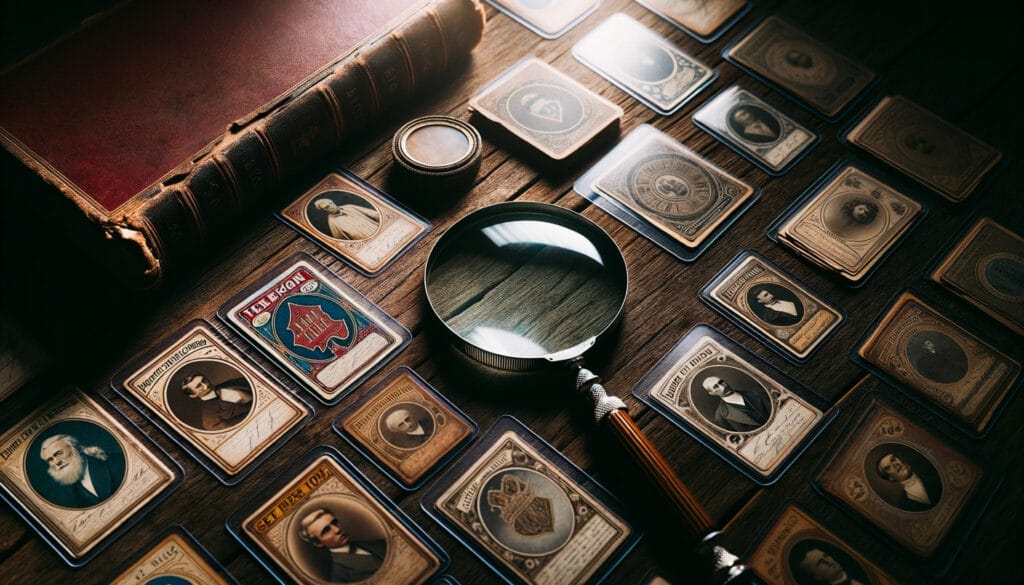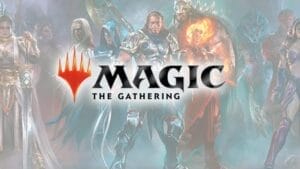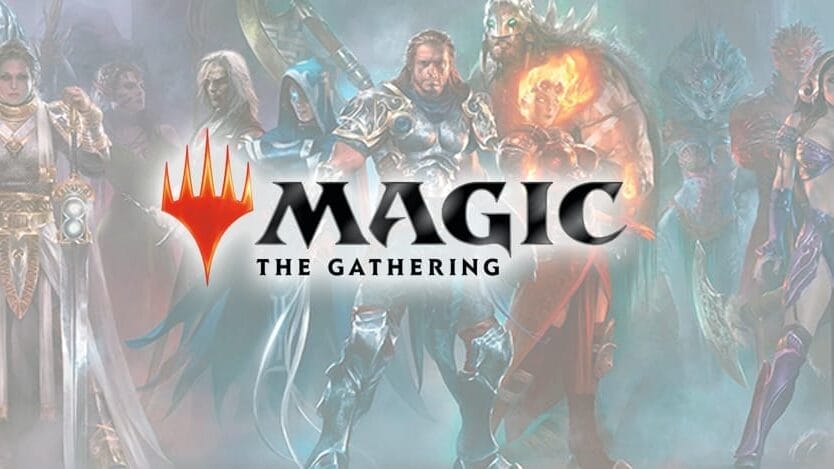
I. Introduction
Welcome to the fascinating world of trading cards, a realm where childhood nostalgia meets adult ambition, where passion intertwines with profit! Whether you’re a fan of sports cards, Pokémon, or Magic: The Gathering, the universe of trading cards is as diverse as it is captivating. But there’s one question that always seems to hover in the background: Is collecting trading cards worth it?
Let’s embark on a journey to uncover the answer. Buckle up, because this ride is going to be full of thrilling discoveries, valuable insights, and a whole lot of fun!
In the world of trading cards, there are two types of enthusiasts. There are those who collect for the sheer joy of it, driven by their love for a particular sport, character, or series. Then there are those who see trading cards as an investment, a potential avenue for financial gain. Both perspectives are valid, and both contribute to the dynamic, ever-evolving landscape of trading card collection.
Collectors find immense joy in the simple act of acquiring new cards. The thrill of opening a new pack, the satisfaction of completing a set, the excitement of stumbling upon a rare card – these are experiences that money can’t buy. For collectors, the true value of collecting trading cards lies not in the cards’ monetary worth, but in the happiness and fulfillment they bring.
Investors, on the other hand, view trading cards through a different lens. They keep a keen eye on market trends, carefully study the performance of players or characters, and understand the impact of card grading on value. For investors, a trading card’s worth is primarily determined by its potential to appreciate over time.
But whether you’re a collector or an investor, one thing is certain: the world of trading cards is an exciting place to be. So, is collecting trading cards worth it? Let’s continue our journey to find out!
Table of Contents
II. The Joy of Collecting Trading Cards
As we delve into the magical world of collecting trading cards, we find that the journey is as delightful as the destination. The thrill of the hunt, the anticipation of what each new pack might hold, the elation of finding a rare or coveted card – these are the moments that make this hobby so captivating.
Imagine this: you’re a kid again, holding a fresh pack of trading cards in your hands. Your heart races as you tear open the pack, your eyes wide with anticipation. As you flip through the cards, each one brings a rush of excitement. And then, there it is – the card you’ve been hoping for, the one that completes your set, or perhaps a rare gem that you’ve been chasing for ages. The thrill of that moment, the joy of that discovery, is what collecting trading cards is all about.
Collecting trading cards isn’t just about the tangible objects themselves. It’s about the experiences, the memories, and the connections that come with it. Many collectors fondly recall their childhood days spent trading cards with friends, carefully organizing their collections, and feeling a sense of accomplishment when they acquired a coveted card. Collecting trading cards allows them to relive those cherished memories and reconnect with their inner child.
Beyond the nostalgia, collecting trading cards also offers a sense of community and connection. Whether it’s swapping cards with friends, discussing collections online, or attending trading card conventions, collectors form bonds over their shared passion. These interactions foster friendships and create a supportive network of like-minded individuals.
III. Educational Benefits
While the thrill of collecting is a significant part of the allure, the act of collecting trading cards can also serve as a catalyst for learning and cognitive development. Yes, you heard it right! Collecting trading cards isn’t just a pastime; it’s a brain-training exercise in disguise.
When children (or adults, for that matter) collect trading cards, they’re not just amassing a pile of glossy rectangles. They’re developing critical skills that can aid them in other areas of their lives. One of these is memory development. The need to remember what cards they already have and which ones they still need to complete their collection can help enhance their memory skills.
The act of collecting trading cards also fosters organizational skills. Think about it: you’ve got a growing collection of cards, and you need to figure out the best way to sort and display them. This requires a level of strategic thinking and organization. Whether it’s by team, character, color, or some other criteria, collectors develop their own systems of organization that make sense to them. This isn’t just about keeping things tidy; it’s about creating a system and understanding its logic.
Moreover, collecting trading cards can even help enhance numerical skills. For instance, if children stick the trading cards they collect in albums, they can learn numbers and order. Furthermore, reading skills can also be improved as children read the character’s name and description printed on the trading card out loud.
Collecting trading cards is also a social activity that can help children develop social skills. Asking their relatives, colleagues, and friends questions about the common objects they collect enhances these skills. It also develops the ability to negotiate to satisfy a need, while taking into account solutions for the person they’re negotiating with. This hobby, therefore, also teaches children how to socialize, recognize and defend their peers’ rights, and how to obtain things in the best possible way.
IV. Financial Literacy and Responsibility
As you delve deeper into the captivating world of collecting trading cards, you’ll find that it’s not just about amassing a collection of your favorite characters or teams. It’s also about learning valuable lessons in financial literacy and responsibility.
Imagine this scenario: You’re at a trading card shop, and you see a rare card that you’ve been longing to add to your collection. But there’s a catch – it’s a little pricier than what you have in your budget. What do you do? Do you splurge and buy the card, or do you save up and wait for the right time to purchase it? This scenario is one that many collectors face, and it’s a valuable lesson in financial decision-making.
Collecting trading cards teaches you about budgeting. You learn to allocate a certain amount of your funds towards your hobby, and you learn to stick to that budget. This practice instills discipline and control, as you resist the urge to overspend and instead make calculated decisions on when to buy, sell, or trade your cards.
In addition to budgeting, collecting trading cards also introduces you to the concept of investment. Some collectors buy cards not just for their personal enjoyment, but also for their potential to increase in value over time. They study market trends, keep an eye on the performance of certain players or franchises, and understand the impact of rarity and condition on a card’s worth. This understanding of investment and market dynamics is a valuable skill that can be applied in various aspects of life.
Lastly, collecting trading cards teaches you about risk management. As with any investment, there’s always a degree of risk involved. A card’s value can fluctuate based on numerous factors, and there’s always the risk of loss. But as collectors, you learn to manage these risks. You learn to diversify your collection, to buy and sell at the right time, and to protect your cards to maintain their condition.
V. Social Skills Development
The world of collecting trading cards is not just about the cards themselves, but also about the people who collect them. As you navigate through this universe, you’ll find that it’s not just about trading cards; it’s about forming connections, building relationships, and learning valuable social skills.
Collecting trading cards introduces you to a vibrant community of like-minded individuals. Whether it’s attending local card shops, participating in online forums, or attending trading card conventions, you’ll have the opportunity to interact with other collectors. This interaction fosters friendships, shared experiences, and a sense of belonging.
Moreover, collecting trading cards also teaches you valuable negotiation skills. Trading cards with other collectors requires understanding each other’s needs and desires, and finding a mutually beneficial agreement. This process involves negotiation, persuasion, and understanding – skills that are valuable in many aspects of life.
Furthermore, collecting trading cards can also help you develop empathy and understanding. As you interact with other collectors, you’ll learn to appreciate different perspectives, understand their motivations, and empathize with their experiences. This understanding fosters a sense of community and inclusivity.
VI. Cognitive Development
Collecting trading cards is not just a hobby; it’s also a brain workout. The act of collecting trading cards can stimulate various cognitive skills, such as memory, concentration, and critical thinking. Let’s delve into how collecting trading cards can aid in cognitive development.
Memory Development
Collecting trading cards requires a good memory. You need to remember what cards you already have and which ones you still need to complete your collection. This constant exposure to these cards and their attributes can enhance memory retention and recall.
Number Recognition
Number recognition is another cognitive skill that can be improved while collecting trading cards. If you’re organizing your cards by number, you’ll need to recognize the numbers on the cards and remember where each card goes. This process can help enhance your number recognition skills.
Reading Skills
Reading skills can also be improved as you collect trading cards. As you read the descriptions and names on the cards, you’re exercising your reading comprehension skills. This can help improve your reading speed and understanding of text.
Problem-Solving Skills
Trading card games often involve complex problems to solve. Players must analyze the game state, assess their available resources, and formulate effective strategies to overcome their opponents. This constant problem-solving exercise hones their ability to think critically, evaluate different options, and make informed decisions. By regularly engaging in trading card games, individuals can develop an analytical mindset that allows them to approach problems in a systematic and logical manner.
Concentration and Focus
During trading card game matches, players need to maintain focus and concentration to make optimal decisions and react to their opponents’ moves effectively. The complex gameplay mechanics and the need to anticipate future outcomes require players to stay mentally engaged throughout the game. Regularly engaging in trading card games can help individuals strengthen their ability to concentrate, ignore distractions, and maintain a sharp focus for extended periods.
VII. Are Trading Cards Worth Anything?
While the joy, educational benefits, and social skills development associated with collecting trading cards are undeniable, many collectors also view trading cards as a potential investment. The financial value of trading cards can be influenced by several factors, including rarity, condition, popularity, and market trends.
Rarity and Popularity
Rarity and popularity are two of the most significant factors that determine the value of a trading card. Rare cards, especially those that are autographed or in mint condition, can fetch high prices. For instance, the most valuable trading card ever sold, the 1909 Honus Wagner card, was sold for more than $3.1 million in 2016.
The value of a card can also be influenced by its popularity. Certain characters or franchises are more sought after by collectors, which can drive up their value. For example, baseball cards, which started as early as the 1860s, represent the largest share of trading card sales.
Condition
The condition of a card is another crucial factor that affects its value. Cards that are in mint condition or near-mint condition are typically more valuable than those that are damaged or worn. This is because collectors often prefer to buy cards in good condition, as it increases the enjoyment of owning and displaying the card.
Market Trends
Market trends also play a significant role in determining the value of trading cards. For instance, the rise of digital games and the proliferation of sports channels have contributed to a surge in the trading card industry. The increased interest in trading cards, driven by factors like nostalgia, confidence, and screen time, has led to a 92% increase in trading card sales in 2020.
Ensuring Authenticity
To ensure the authenticity of trading cards, collectors often seek advice from experts or use certified grading services. These services can authenticate the card, confirm its rarity, and provide a grading based on its condition. This can help collectors avoid scams and ensure they’re buying a genuine, high-value card.
In conclusion, while the value of trading cards can vary based on several factors, the trading card industry is indeed a lucrative market for collectors and investors alike. As the industry continues to grow and evolve, the value of certain card collections is likely to rise, making collecting trading cards a potentially profitable venture.
VIII. Tips for Successful Card Collecting
Collecting trading cards can be an exciting and rewarding hobby, but it requires careful planning and strategy. Here are some tips to help you succeed in your card collecting journey:
Setting a Budget
Before you start collecting, it’s important to set a budget. This will help you control your spending and ensure that you’re able to afford the cards you want. It’s also a good idea to allocate a portion of your budget towards purchasing cards that you’re interested in, rather than just buying the latest releases 4.
Researching the Market
Understanding the market trends and the value of different cards can help you make informed decisions when buying, selling, or trading cards. This can also help you identify rare or valuable cards that you might want to add to your collection.
Proper Storage and Care
Proper storage is crucial to preserve the value and condition of your cards. It’s recommended to keep your cards in a clean, dry environment, away from direct sunlight. Using protective sleeves or top loaders can add an extra layer of protection for your most valuable cards. Regularly check for any signs of wear or damage to your storage solution and replace or repair as needed.
Professional Grading
For serious collectors or those interested in investing in trading cards, professional grading can provide an objective assessment of a card’s condition. This can be particularly useful when buying or selling cards, as it can help you determine a card’s value and authenticity.
Organizing Your Collection
Organizing your collection can make it easier to keep track of your cards and find the ones you’re looking for. You can organize your cards by set, rarity, or other categories. Storage options with labeled dividers or customizable sections offer efficient organization and easier card retrieval.
IX. Conclusion
As we wrap up our journey into the world of trading card collecting, we can’t help but reflect on the myriad of benefits this hobby offers. From the pure joy of discovery to the cognitive development it promotes, from the social connections it fosters to the financial opportunities it presents, trading card collecting is indeed a worthwhile pursuit.
Collecting trading cards is not just about amassing a collection of your favorite characters or teams. It’s about the journey, the thrill of the hunt, and the satisfaction of completion. It’s about the memories, the connections, and the shared experiences. It’s about the community, the shared passions, and the shared laughter. It’s about the lessons learned, the skills developed, and the joy derived from the hobby.
But collecting trading cards also offers the potential for financial gain. Rare and sought-after cards can appreciate in value over time, making collecting cards an exciting financial opportunity. However, it’s important to note that investing in trading cards requires careful research and expertise to ensure a successful return on investment.
Ultimately, whether collecting trading cards is worth it depends on your individual goals and interests. If you’re collecting simply for the joy of it, then the financial return may not be as important. However, if you’re looking to invest in trading cards with the expectation of making a profit, it’s important to do your research, understand the market, and be prepared for potential fluctuations in value.
In conclusion, trading card collecting is a hobby that offers a unique mix of joy, learning, and potential financial gain. Whether you’re a child just starting out or an adult looking for a new hobby, collecting trading cards is definitely worth considering. So, is collecting trading cards worth it? The answer is a resounding yes. It’s a hobby that brings joy, promotes learning, fosters social skills, and can even be a source of financial gain. So, why wait? Dive into the world of trading card collecting and experience the joy it brings.






